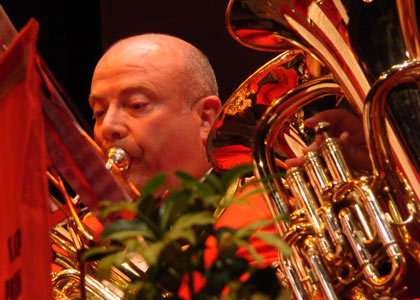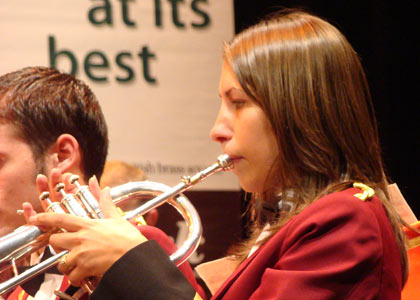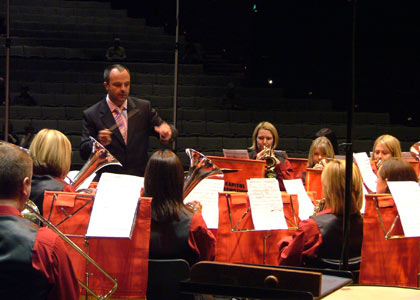2007 Lower Section National Finals - Second Section retrospective
4-Oct-2007The Welsh sporting public didn't have a great deal to shout about on the weekend, but the music lovers found plenty to be proud of in the Second Section.
In modern day life, time is one of our most precious commodities, so we’re always looking for shortcuts in the things we do. Take cooking for instance – don’t defrost the chicken properly you got for Sunday dinner and the next thing you have is a nasty dose of food poisoning. Follow the instructions though (on the tin or the package – you will see why we are using the analogy pretty soon) and things should be OK.
The same goes for the preparation of a test piece with instructions from a composer. If there are directions in the score such as ‘Driving’, ‘Reflective’ or ‘Poco agitato’ then that’s what the chap intended in the first place – and judges are the type of cooks who like following the instructions – almost to the letter.
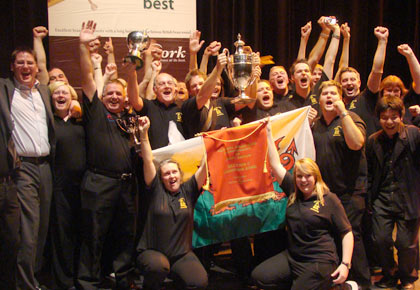
Welsh wonders: Forget the rugby Wales have a winner!
For Colin Hardy and Philip Harper, the secret to finding the winning success in Darrol Barry’s new work, Toccata, Elegy and Scherzo was, as they put it, ‘doing what it says on the tin’, ‘…as per instructions on the score’. In short, those who took notice of the markings, got rewarded for their efforts, and those who didn’t, missed out.
Darrol Barry’s piece in effect proved to be a tough ask for many of the bands on the day itself. The suite provided many challenges throughout, from the opening ‘Toccata’, a taxing ‘Elegy’ that exposed soprano, principal cornet, euphonium and flugel, and the closing, playful ‘Scherzo’. It was the type of work needed to find a National Champion.
For those who took notice got their just rewards whilst in some cases (and forgive the cookery pun), the bands got their just desserts. There were no bad performances, plenty of admirable ones, but plenty that didn’t take enough notice of the directives in the score.
Both Colin and Philip spoke eloquently to the audience, whilst Philip was the one who spoke extensively about the piece, reinforcing the point that if bands ‘did what it said on the tin’ they were subsequently rewarded for their efforts.
Praise was given to the soloists, but overall both men knew what they wanted to hear, had done their preparation (especially Colin) and nobody could have had any complaints about the result. In the end though, cometh the results, it was the Welsh bands who had most to celebrate, providing the rugby fans amongst them something to seriously lift their spirits after the Principality’s rugby team went out of the World Cup 24 hours earlier.
The victors were Newbridge (Celynen) from South Wales, led by Paul Holland, whilst Beaumaris ‘B’ from North Wales under Gwyn Evans took the runners-up spot. To suggest that the Welsh dragon roared on Sunday evening is a bit of an understatement. It scorched the opposition.
Newbridge (Celynen) were more than worthy winners. This was one of those days when being drawn early (number three) didn’t make any difference. The band’s conductor, Paul Holland told 4BR afterwards that the band had worked hard on keeping control of both dynamics and tempo as last year they left the door open and paid the penalty. This year they all but slammed it shut.
Anything was possible of course it is, but Newbridge’s performances left an impression on the adjudicators that meant it would take something exceptionally special to remove it from top spot, and despite a super effort from their north Wales rivals, they were never seriously threatened.
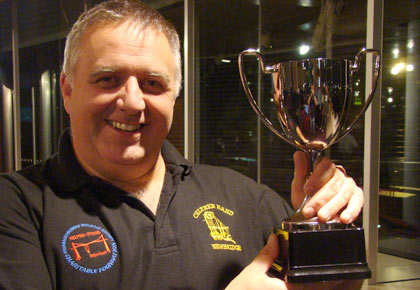
Best Soloist: Nigel Thomas enjoys his bit of glory
Their opening was strong and purposeful and the dynamics were terrific. In the middle ‘Elegy’ section, the mood was reflective with Ellie Holland taking the opening exposed soprano part in her stride, and this was followed by a fine performance on principal cornet Andrew Smith, and an exquisite solo performance on euphonium from Nigel Thomas that earned him the Best Instrumentalist prize. Rob Nesbitt on flugel also maintained the standard of the soloists that had gone before him in a movement of rich musical excellence.
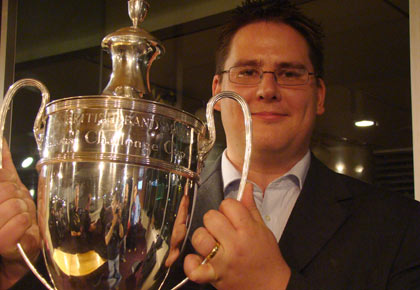
Welsh Dragon: MD Paul Holland gets his hands on the Second Section silverware
The final ‘Scherzo’ section was again full of good solid playing, accurate tempi and some well-drilled percussion that enhanced the performance, and all the band could do was wait another four hours or so to see what the judges really thought. They need not have worried.
On another day, Beaumaris ‘B’ could’ve been crowned the champions. Gwyn Evans and his band played just before the comfort break and gave the judges something to ponder. Once again this was a solid, musical performance that benefited from some excellent ensemble and solo work around the stand, not forgetting plenty of experience too with Gavin Saynor in the bass section, who was nothing short of colossal throughout.
Battling into second place: Beaumaris B make it a Welsh 1/2
In the end though, and despite some excellent direction from the middle and a band playing almost to the top of its form, it wasn’t enough to overcome Newbridge who on the day had that extra edge. The winning margin perhaps flattered a little, and so the gap to third place, but these were performances to savour.
Third place went to Phoenix West Midlands Brass who benefited from a fine interpretation from MD David Maplestone who drove the band’s performance throughout with so much enthusiasm.
Phoenix from the flames: The midlanders gain a top three spot for their efforts
Everything settled down very quickly with excellent dynamics, fine ensemble work and Lisa Jenks shining like a sparkling diamond in the solo passage in the ‘Elegy’ movement. The final closing ‘Scherzo’ was as good as what had gone before it and unless there was going to be three superior performances thereafter (they drew thirteen) they were odds on a podium finish were high and well deserved. It was a fine performance and very much the best of the non Welsh rivals.
Norman Law, who conducted without a score, led Wakefield Metropolitan. This was another solid interpretation although it didn’t quite have enough to disturb Newbridge and Beaumaris from the top two, or perhaps dislodge Phoenix. Richard Larder produced plenty of quality in the principal cornet chair that was matched by the other soloists and the direction from the middle was clear and precise. Norman Law led the way on the day and the band responded superbly with a high quality performance.
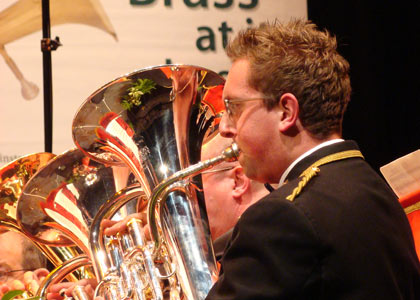
Solid as a rock: Wakefield take fourth place with a solid performance
Yorkshire bands continued to make an impression on the top with six with Kippax finishing fifth. Alan Morrison directed the band that included members of his own family, and his experience certainly bore fruit on the day. Playing last band on meant they had nothing to lose and everything to gain, and the direction and interpretation was solid, with some fine quality playing from around the stand. It didn’t quite have enough to push into the top three, but it was a rousing performance of real merit.
North West outfit, Wardle and District Anderson Brass made the earliest impression on the contest from the number 2 draw and in the end were worthy of a top six place.
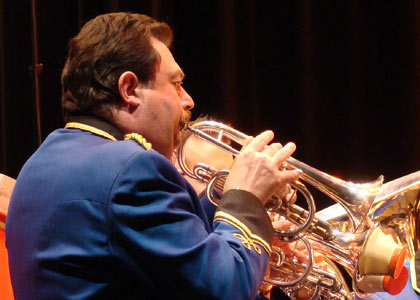
Yorkshire grit: Kippax had for the prizes in fifth place
Throughout there was confidence playing with excellent ensemble and solo playing and purposeful direction from Sean Conway. The door was left open though and in the end five bands finished ahead of them. They should be pleased though to have made the short journey back over the Pennines finishing in the top six, and they are a band that is well worth keeping the eye on for later in the year.
Outside of the top six there weren’t many bands that did what it said on the tin, as Philip so pointedly said, to consistently merit a strong enough challenge. Consistency over the three movements proved a tough ask on the day.
The Conway way: Wardle's MD Sean Conway leads his band into the prizes
Picture: Steve Jack
Portishead, Wansbeck’s Ashington and Blackpool were three bands that if they’d just had that important essence throughout could have challenged for a place in the top six.
Portishead took time to settle and it was the opening ‘Toccata’ movement that seemed a bit on the strong side dynamically and which may have cost them a few valuable points on the day. The ‘Elegy’ though was a different ball game with plenty of fine playing from ensemble and soloists with Dale Price on euphonium and Steve Tripp on flugel the real stars. The closing section was also impressive but that opening movement was perhaps the cause of them not coming any higher than they eventually did.
Wansbeck’s Ashington Colliery’s highlight was also the middle, reflective ‘Elegy’ section with the outer movements not coming off with the same control and obvious sense of controlled quality. The opening was perhaps a bit too full on and at times the closing ‘Scherzo’ was in a similar vein. It was a real pity that the middle movement wasn’t matched elsewhere as they could have really made a mark.
Andrew Warriner’s Blackpool Brass have been consistent performers in the Second Section in the North West over the past two years, and although they benefited from having played on the Harrogate stage last year, they didn’t really produce the best form we have heard from them in recent times. It was a good reading, fairly solid, but just needed that extra coat of varnish so to speak to make it stand out. Perhaps their best performance was left in the final rehearsal room.
Ocean Brass, Egham, Granite City and St Ronan’s were four more bands who never quite had the overall consistency required on the day to challenge higher up the prize table.
Ocean Brass was definitely the strongest of the four performers and it was a performance that grew in stature and confidence as it progressed. The opening seemed to be a bit of a struggle, but an improved middle ‘Elegy’ and a purposeful ‘Scherzo’ pulled them back on track.
Meanwhile, Egham and Gareth Green started off with rich promise, but it just became a little too forceful in places. The middle ‘Elegy’ had some lovely solo lines although the ensemble at time never gelled whilst the closing ‘Scherzo’ seemed to tire and got scrappy. They can have no complaints like their rivals of ending up just outside the prizes.
The two Scottish contenders, Granite City and St Ronan’s suffered from opening ‘Toccata’ sections that undermined their chances. In the case of Granite City, the ensemble was scrappy and the dynamics were perhaps too heavy and it was only in the ‘Elegy’ where Stewart Gilmore on flugel was the star that the band showed what it was capable off.
St Ronan’s we suggested in our live comments was ‘over zealous in the opening movements may prove costly’ and it did. It was tough going at times on the ear, particularly in the outer movements, and it was only in the middle section where Ian Aitchison, David Lindsay and Jill Keddie on cornet, euphonium and flugel produced their strongest moments. More of that high standard playing and they could well have finished much higher.
That just left Cawston, Harborough and Cockerton Silver.
Cawston drew the dreaded number one and produced a decent performance that was just a bit over powerful in the opening ‘Toccata’ and just lacked for control and lyricism in the ‘Elegy’. They got back on track with the ‘Scherzo’, but overall they did find the work stretching them to the limits.
Harborough and Chris Groom was a similar story too. Plenty to admire but it wasn’t tight enough throughout and coupled with expensive errors it wasn’t their best day at the office. There is a good band in the making here, if they can just tighten up on the ensemble precision.
Finally, Cockerton who started well and promised much, but soon became loose in the ensemble and was another band that lacked consistency throughout the three movements to have made a real impact on the day.
It was Wales’ day though and the Welsh dragon certainly roared on Sunday evening. Newbridge (Celynen) had more than enough quality to give them the title with a little bit to spare in all honesty, whilst Beaumaris ‘B’ had more than enough quality to push them just about all the way.
The infamous ‘tin’ that the adjudicators had so gone on about turned out to be a pot of gold for MD Paul Holland and his band, with a fine silver one for Beaumaris and a decent bronze one for Phoenix. Many others though will heed the lesson to read what it says on the instructions the next time.
Malcolm Wood



